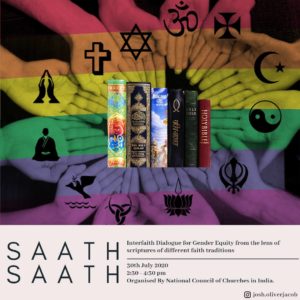Saath – Saath: An Interfaith Dialogue For Gender Equity from the lens of scriptures of different traditions

The beautiful narrative of creation of human being is that we are tailor made by God, who is our creator and sustainer and even though has given us free will to choose but expects that we are more responsible for the choices we make. Often the choices we as humans make are for seeking the power and pleasure for ourselves. Later accounts portray such a self-seeking approach to distort the image of God in every human person and deform creation. One such distortion and deformation which plagues our society is gender inequality. The domination by the “mighty” who subjugates the “weak” is a challenge to balance of God endowed creation equality.
Religion is knowing God and following the faith we believe in. Religion plays a vital role in shaping cultural, social, economic, and political norms in many parts of the world. Thus, gender stereotypes and the status of women and men in society are deeply tied to the manner in which religious texts have been interpreted for centuries by those in positions of power—positions held predominantly by men.The relationship between religion and gender equality is a complex one. Yet, in sharp contrast to marked absence of all gender at the highest levels of decision-making in religious communities, women and all genders play a pivotal role in religious life. Within the family and the community, they implement and embody religious teachings and traditions, and pass these on to future generations. The role of faith-based organizations, institutions and actors in the gender equality agenda is multifaceted: while often rooted in patriarchal traditions, they are also among the powerful agents of social change. The language of faith reaches to the deepest roots of human motivation, mobilizing individuals and communities to sacrifice comfort and material wealth in pursuit of higher goals. In addition, faith-based organizations and institutions are among the largest, most stable, and well-resourced social networks.
Various faith Scriptures can play a vital role in re-establishing the balance in today’s world where Gender based inequality is rampant. We need to ask these vital questions: Is religion a barrier to gender equality? Distinction between (Institutionalised) Religion and what various Scriptures actually promote!
Saath – Saath looks forward to be a collaboration which is rooted in the understanding that in today’s world, where 8 out of 10 people identify as members of a religious or spiritual community, where religion exerts tremendous influence on people’s both women and men, identities, behaviours, and beliefs. As the oldest providers of social and humanitarian assistance, Faith-based organizations with their networks and resources reaching every corner of the globe are uniquely poised to impact the world in a more profound manner and set a more positive tone. Much more needs to be done for challenging the patriarchal structures, beliefs, and practices that have perpetuated inequality and discrimination against women and girls. While they have been instrumental in promoting spiritual, social, and physical wellbeing, faith-based organization still can be more proactive in engaging in the work of structural transformation required for secure equity and justice for all.
In “Saath – Saath’ we desire come together to look into our faith heritage captured in our scriptures. The desire is to reclaim the divinity of all human beings. Let us listen to what various scriptures say, with a purpose that faith leaders can be co-partners and collaborators in promoting and protecting Gender equity. Let us get inspired from our faith Scriptures and explore how Scriptures of various faith traditions preserve and promote Gender-parity.
Let’s Listen to what they have to say:
Dr A K Merchant is the national trustee Cum Secretary, Lotus Temple. A Doctor by Profession and very much active with social concern, he is a champion on topics like culture, religion and environment.
Tashi Choedup is a Queer Buddhist, monastic Buddhist philosopher and volunteering in Bodhgaya, Bihar. He is an activist and has been active in writing as well.
Rev M Jyothi Sunder is a ordained minister in Medak Diocese, CSI for 20 years. She had done her MTh in OT and MA in women Studies. She is also the President for Association of Theological Trained Women in India (ATTWI),
Ms Sribala Mylavarapu is a teacher of Sanskrit. She is staff at HMI, Hyderabad. She is programme officer for Academic Extension Programme. Her research topic is “Role of women in reconciliation in Faith Engagements”.
Ms Uzma Naheed is a member of Indian Muslim Personal Law Board and is a champion on Gender Justice. She has worked tirelessly for justice for women right from the Islamic context.
Ms Ashmeet Kaur Bilkhu is a young dynamic worker who has done her MPhil in “ Women and Gender Studies”. She is involved in developing curriculum at ISST for “ women And Work”. She writes on issues of gender politics and culture.
Dr Vihutoli Kinny is a lecturer at Nito Theological College, Nagaland. She is serving at department of Religion. Her research on doctoral studies was on : Social relevance of the religious thought of Swami Vivekananda today wit special reference to practical Vedanta.”
Ms D Reshma is working as an Assistant Professor at SSS, Shasun Jain College. She is a champion for the gender cause and has been dealing with many other issues as well. She has a special way on interacting with people of all age.
Mr Ankit Bhupati is a Human Right Activist and founder of Queer Hindu Alliance. He is a devout Hindu who finds his soul in Bhakti.
Let us join our panellist to be the voices of justice and equality. Let us ask questions not to others only, but to and for ourselves.
Let’s revisit and reclaim what is right.
Join in : Registration Form
Rev. Jyoti Singh Pillai
Executive Secretary, NCCI Women’s’ Concerns
For any Queries Please Contact: jyoti@ncci1914.com Or ncci@ncci1914.com









Leave a Reply
Want to join the discussion?Feel free to contribute!